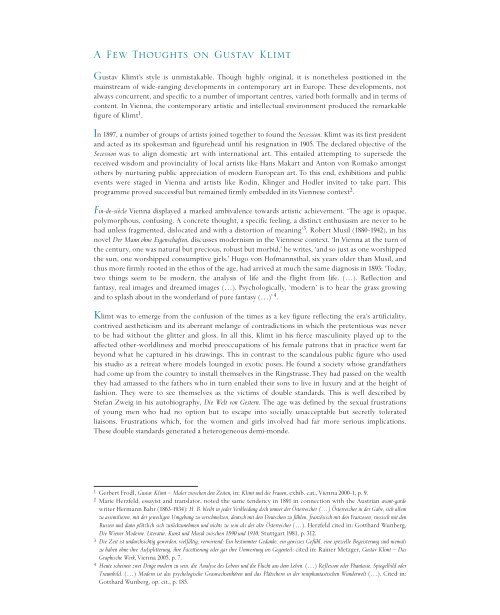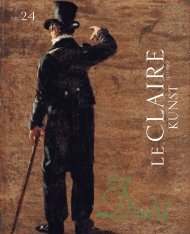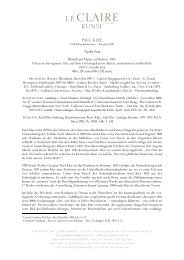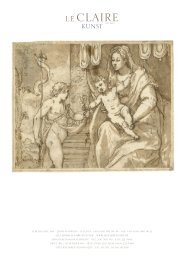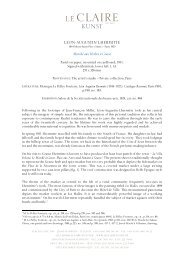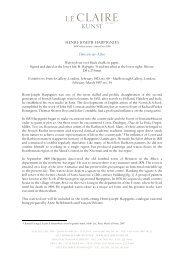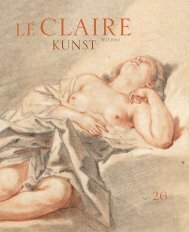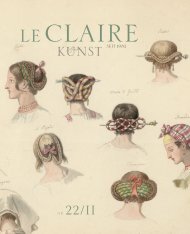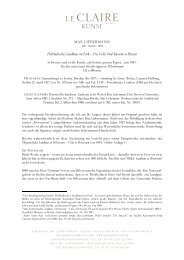Download - leclaire-kunst.de
Download - leclaire-kunst.de
Download - leclaire-kunst.de
Erfolgreiche ePaper selbst erstellen
Machen Sie aus Ihren PDF Publikationen ein blätterbares Flipbook mit unserer einzigartigen Google optimierten e-Paper Software.
A Few Thoughts on Gustav Klimt<br />
Gustav Klimt’s style is unmistakable. Though highly original, it is nonetheless positioned in the<br />
mainstream of wi<strong>de</strong>-ranging <strong>de</strong>velopments in contemporary art in Europe. These <strong>de</strong>velopments, not<br />
always concurrent, and specific to a number of important centres, varied both formally and in terms of<br />
content. In Vienna, the contemporary artistic and intellectual environment produced the remarkable<br />
figure of Klimt 1 .<br />
In 1897, a number of groups of artists joined together to found the Secession. Klimt was its first presi<strong>de</strong>nt<br />
and acted as its spokesman and figurehead until his resignation in 1905. The <strong>de</strong>clared objective of the<br />
Secession was to align domestic art with international art. This entailed attempting to superse<strong>de</strong> the<br />
received wisdom and provinciality of local artists like Hans Makart and Anton von Romako amongst<br />
others by nurturing public appreciation of mo<strong>de</strong>rn European art. To this end, exhibitions and public<br />
events were staged in Vienna and artists like Rodin, Klinger and Hodler invited to take part. This<br />
programme proved successful but remained firmly embed<strong>de</strong>d in its Viennese context 2 .<br />
Fin-<strong>de</strong>-siècle Vienna displayed a marked ambivalence towards artistic achievement. ‘The age is opaque,<br />
polymorphous, confusing. A concrete thought, a specific feeling, a distinct enthusiasm are never to be<br />
had unless fragmented, dislocated and with a distortion of meaning’ 3 . Robert Musil (1880-1942), in his<br />
novel Der Mann ohne Eigenschaften, discusses mo<strong>de</strong>rnism in the Viennese context. ‘In Vienna at the turn of<br />
the century, one was natural but precious, robust but morbid,’ he writes, ‘and so just as one worshipped<br />
the sun, one worshipped consumptive girls.’ Hugo von Hofmannsthal, six years ol<strong>de</strong>r than Musil, and<br />
thus more firmly rooted in the ethos of the age, had arrived at much the same diagnosis in 1893: ‘Today,<br />
two things seem to be mo<strong>de</strong>rn, the analysis of life and the flight from life. (…). Reflection and<br />
fantasy, real images and dreamed images (…). Psychologically, ‘mo<strong>de</strong>rn’ is to hear the grass growing<br />
and to splash about in the won<strong>de</strong>rland of pure fantasy (…)’ 4 .<br />
Klimt was to emerge from the confusion of the times as a key figure reflecting the era’s artificiality,<br />
contrived aestheticism and its aberrant melange of contradictions in which the pretentious was never<br />
to be had without the glitter and gloss. In all this, Klimt in his fierce masculinity played up to the<br />
affected other-worldliness and morbid preoccupations of his female patrons that in practice went far<br />
beyond what he captured in his drawings. This in contrast to the scandalous public figure who used<br />
his studio as a retreat where mo<strong>de</strong>ls lounged in exotic poses. He found a society whose grandfathers<br />
had come up from the country to install themselves in the Ringstrasse.They had passed on the wealth<br />
they had amassed to the fathers who in turn enabled their sons to live in luxury and at the height of<br />
fashion. They were to see themselves as the victims of double standards. This is well <strong>de</strong>scribed by<br />
Stefan Zweig in his autobiography, Die Welt von Gestern. The age was <strong>de</strong>fined by the sexual frustrations<br />
of young men who had no option but to escape into socially unacceptable but secretly tolerated<br />
liaisons. Frustrations which, for the women and girls involved had far more serious implications.<br />
These double standards generated a heterogeneous <strong>de</strong>mi-mon<strong>de</strong>.<br />
1 Gerbert Frodl, Gustav Klimt – Maler zwischen <strong>de</strong>n Zeiten, in: Klimt und die Frauen, exhib. cat., Vienna 2000-1, p. 9.<br />
2 Marie Herzfeld, essayist and translator, noted the same ten<strong>de</strong>ncy in 1891 in connection with the Austrian avant-gar<strong>de</strong><br />
writer Hermann Bahr (1863-1934): H. B. bleibt in je<strong>de</strong>r Verkleidung doch immer <strong>de</strong>r Österreicher (…) Österreicher in <strong>de</strong>r Gabe, sich allem<br />
zu assimilieren, mit <strong>de</strong>r jeweiligen Umgebung zu verschmelzen, <strong>de</strong>utsch mit <strong>de</strong>n Deutschen zu fühlen, französisch mit <strong>de</strong>n Franzosen, russisch mit <strong>de</strong>n<br />
Russen und dann plötzlich sich zurückzunehmen und nichts zu sein als <strong>de</strong>r alte Österreicher (…). Herzfeld cited in: Gotthard Wunberg,<br />
Die Wiener Mo<strong>de</strong>rne. Literatur, Kunst und Musik zwischen 1890 und 1910, Stuttgart 1981, p. 312.<br />
3 Die Zeit ist undurchsichtig gewor<strong>de</strong>n, vielfältig, verwirrend: Ein bestimmter Gedanke, ein gewisses Gefühl, eine spezielle Begeisterung sind niemals<br />
zu haben ohne ihre Aufsplitterung, ihre Facettierung o<strong>de</strong>r gar ihre Umwertung ins Gegenteil: cited in: Rainer Metzger, Gustav Klimt – Das<br />
Graphische Werk, Vienna 2005, p. 7.<br />
4 Heute scheinen zwei Dinge mo<strong>de</strong>rn zu sein, die Analyse <strong>de</strong>s Lebens und die Flucht aus <strong>de</strong>m Leben. (…) Reflexion o<strong>de</strong>r Phantasie, Spiegelbild o<strong>de</strong>r<br />
Traumbild. (…) Mo<strong>de</strong>rn ist das psychologische Graswachsenhören und das Plätschern in <strong>de</strong>r reinphantastischen Wun<strong>de</strong>rwelt (…). Cited in:<br />
Gotthard Wunberg, op. cit., p. 185.


